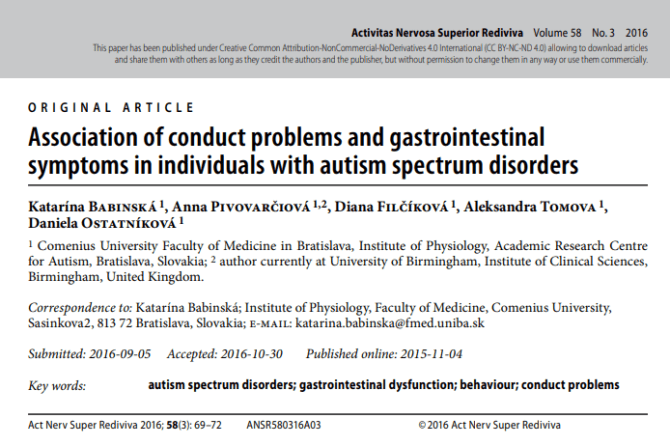
AUTHORS: Babinská, K., Pivovarčiová, A., Čelárová, D., Sashova Tomova, A., Ostatníková, D.
ABSTRACT: Objectives: A sizeable fraction of individuals with autism spectrum disorder (ASD) is affected by a variety of comorbid conditions including behavioural or psychiatric disorders, and medical problems. The evidence indicates that behavioural symptoms and gastrointestinal (GI) dysfunction are possibly interrelated phenomena in ASD, and it is hypothesized that they may have common underlying mechanisms. The aim of the study was to investigate associations between GI symptoms and conduct problems in individuals with ASD.
Methods: The study involved 102 participants aged 3–18 years. Nisonger Child Behavior Rating Form was used for assessment of the conduct problems, and history of GI symptoms was obtained. Score of GI dysfunction and conduct problem score were calculated.
Results: Only 8.7% of participants were free of GI symptoms, majority (56.3%) suffered from severe GI dysfunction. Of the individuals free of GI disorder 20% displayed conduct problems, the frequency increased to 41.9% in the subgroup with mild GI dysfunction, and to 67.9% in subjects with severe GI dysfunction, respectively (p=0.024). The severity of conduct problems significantly correlated with the severity of GI dysfunction (r=0.26; p=0.018).
Conclusion: Our results show association between GI symptoms and conduct problems. Conduct problems may have profound adverse consequences on the individuals. Many of the GI conditions occurring in ASD are treatable, and treatment of the physical problems might have positive effect also on behavioural presentation of autism. It may be possible that research into GI symptoms might elucidate aspects of the underlying neurobiological mechanisms associated with ASD.
Activitas Nervosa Superior Rediviva. – Vol. 58, No. 3 (2016), s. 69-72. – ISSN (print) 1337-933X


